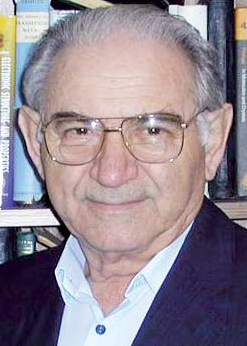Isaac B. Bersuker | |
|---|---|
 Isaac B. Bersuker in 2008 | |
| Born | Isaac Borukhovich Bersuker February 12, 1928 |
| Nationality | Kingdom of Romania |
| Citizenship | United States Moldova |
| Alma mater | Moldova State University (M.Sc.) Leningrad State University (Ph.D.) |
| Known for | Tunneling splitting in polyatomic systems with Jahn–Teller effect and pseudo Jahn–Teller effect Vibronic theory of ferroelectricity and related properties of cubic perovskites Theory of core polarization in Rydberg atoms Quantum chemistry of coordination complexes Electron-conformational approach to drug design and fragrance activity. |
| Spouse |
Lilia B. Bersuker (m. 1951) |
| Children | Son: Gennadi B. Bersuker (b. 1953) |
| Awards | Moldavian SSR State Prize in Science and Technology (1979) Order of Honour (Moldova) (2004) The Medal "Scientific Merit", I class (Moldova) (2021) |
| Scientific career | |
| Fields | Chemical Physics and Physical Chemistry, Theoretical Chemistry, Theoretical Physics, Condensed Matter Physics |
| Institutions | The University of Texas at Austin Academy of Sciences of Moldova |
Isaac B. Bersuker (Russian: Исаáк Бóрухович (Бори́сович) Берсýкер; born February 12, 1928) is a Romanian-born Soviet-Moldоvan-American theoretical physicist and quantum chemist whose principal research is in chemical physics, solid-state physics, and theoretical chemistry. Known for his "life-long years of experience in theoretical chemistry"[1] working on the electronic structure and properties of coordination compounds, Isaac B. Bersuker is “one of the most widely recognized authorities”[2] in the theory of the Jahn–Teller effect (JTE) and the pseudo-Jahn–Teller effect (PJTE). His accomplishments include explaining the polarization of the atomic core in Rydberg atoms, the effect of tunneling splitting in molecules and solids with a strong JTE, and the discovery of the PJTE origin of ferroelectricity in cubic perovskites. Known as the leading expert in JTE and PJTE, Bersuker is the permanent chairman of the international steering committee of the Jahn–Teller symposia.[3] His present affiliation is with the Oden Institute for Computational Engineering and Science of the Department of Chemistry of the University of Texas at Austin.
- ^ Lever, A. B. P. (1999-05-01). "Electronic Structure and Properties of Transition Metal Compounds: Introduction to the Theory By Isaac B. Bersuker (The University of Texas at Austin). John Wiley: New York. 1996. ISBN 0-471-13079-6". Journal of the American Chemical Society. 121 (18): 4544. doi:10.1021/ja975564q. ISSN 0002-7863.
- ^ Kaplan, Michael D. (2006-08-01). "The Jahn−Teller Effect By Isaac B. Bersuker (University of Texas at Austin). Cambridge University Press: Cambridge. 2006. xvi + 616 pp. $185.00. ISBN 0-521-82212-2". Journal of the American Chemical Society. 128 (32): 10631–10632. doi:10.1021/ja069734n. ISSN 0002-7863.
- ^ "Fullerene Theory - University of Nottingham". www.nottingham.ac.uk. Retrieved 2021-12-23.